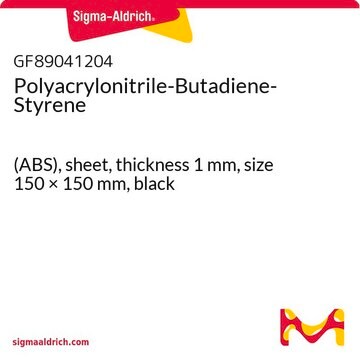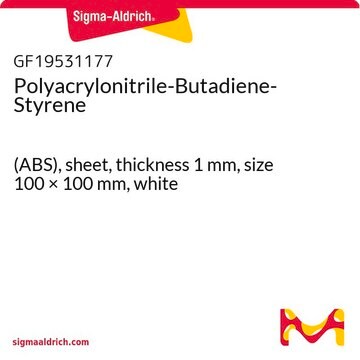Alle Fotos(1)
Wichtige Dokumente
180882
Poly-(acrylonitril-co-butadien-co-styrol)
acrylonitrile ~40 wt. %, powder
Anmeldenzur Ansicht organisationsspezifischer und vertraglich vereinbarter Preise
Alle Fotos(1)
About This Item
Lineare Formel:
[CH2CH(CN)]x(CH2CH=CHCH2)y[CH2CH(C6H5)]Z
CAS-Nummer:
MDL-Nummer:
UNSPSC-Code:
12162002
PubChem Substanz-ID:
Empfohlene Produkte
Form
powder
Zusammensetzung
acrylonitrile, ~40 wt. %
Löslichkeit
acetone, MEK and DMF: soluble
water and alcohols: insoluble
Dichte
1.04 g/mL at 25 °C
SMILES String
C=CC=C.C=CC#N.C=Cc1ccccc1
Suchen Sie nach ähnlichen Produkten? Aufrufen Leitfaden zum Produktvergleich
Leistungsmerkmale und Vorteile
High butadiene content.
Lagerklassenschlüssel
11 - Combustible Solids
WGK
WGK 3
Flammpunkt (°F)
Not applicable
Flammpunkt (°C)
Not applicable
Persönliche Schutzausrüstung
Eyeshields, Gloves, type N95 (US)
Hier finden Sie alle aktuellen Versionen:
Besitzen Sie dieses Produkt bereits?
In der Dokumentenbibliothek finden Sie die Dokumentation zu den Produkten, die Sie kürzlich erworben haben.
Chul-Hyun Park et al.
Environmental science & technology, 42(1), 249-255 (2008-03-21)
Plastics are widely used in everyday life as a useful material, and thus their consumption is growing at a rate of about 5% per year in Korea. However, the constant generation of plastic wastes and their disposal generates environmental problems
Hui Wang et al.
Waste management (New York, N.Y.), 32(7), 1297-1305 (2012-04-17)
The aim of this research was to separate waste plastics acrylonitrile butadiene styrene (ABS) and polystyrene (PS) by dissolved air flotation in a self-designed dissolved air flotation apparatus. The effects of wetting agents, frother, conditioning time and flotation time on
Chun-Chin Wang et al.
Journal of hazardous materials, 145(1-2), 136-141 (2006-12-13)
epsilon-Caprolactam has high COD and toxicity, so its discharge to natural water and soil systems may lead to an adverse environmental effect on water quality, endangering public health and welfare. This investigation attempts to isolate epsilon-caprolactam denitrifying bacteria from a
Bo Lai et al.
Journal of chromatography. A, 1244, 161-167 (2012-05-25)
Acrylonitrile-butadiene-styrene (ABS) resin manufacturing wastewater is a complicated, toxic and refractory industrial wastewater. Comprehensive and accurate analysis of the typical pollutants in ABS resin manufacturing wastewater is critical to develop cost-effective wastewater treatment technologies. In this paper, a comprehensively qualitative
Kwangwon Park et al.
Applied radiation and isotopes : including data, instrumentation and methods for use in agriculture, industry and medicine, 66(12), 1913-1915 (2008-08-22)
In order to practically better cope with technical barriers to trade (TBT) of a great number of resin goods, our research presents first-ever results for the determination of Cd and Cr in acrylonitrile butadiene styrene (ABS) candidate reference material using
Unser Team von Wissenschaftlern verfügt über Erfahrung in allen Forschungsbereichen einschließlich Life Science, Materialwissenschaften, chemischer Synthese, Chromatographie, Analytik und vielen mehr..
Setzen Sie sich mit dem technischen Dienst in Verbindung.







